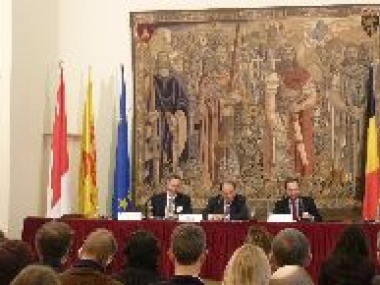EGTC Seminar: Involvement of civil society within cross-border conurbations
Edited on
09 October 2017Develop the inhabitants' feeling of belonging to a cross-border area. Involve civil society within the cross-border public life. Those two questions are fundamental in the construction of cross-border territories and were the heart of the discussion between the 120 participants who assisted to the latest URBACT "EGTC" seminar on February 11th 2010 in Tournai (Belgium).

The EGTC project builds a network of six cross-border conurbations in Europe: the Trinational Eurodistrict Basel, the Strasbourg-Ortenau Eurodistrict, the Frankfurt (O)-Slubice conurbation, the Eurometropole Lille-Kortrijk-Tournai, the Ister-Granum Euroregion, and the Chaves-Verin conurbation. The Mission Opérationnelle Transfrontalière is Lead Partner of the project. The project takes a close look at how the European Grouping of Territorial Cooperation (EGTC), which is today the only European legal tool able to establish a multi-level governance, can be a reference tool to support the governance of cross-border conurbations.
Projects which favour meetings and a common "vivre ensemble"
Various examples of cross-border projects which involve directly the inhabitants from both sides of the border were presented. For example, within the Strasbourg-Ortenau Eurodistrict (Franco- German border), a solidarity run called "solidarity KM" is organized every year in May in order to give the chance to French and German children to meet and run together for a good cause. The Eurocity Chaves-Verin (Spain/Portugal) also presented some cross-border initiatives directly aimed at young people (photography contest, sport meetings…).
Necessity of an active participation and role of the Medias
However, in order to create cross-border communities, involving the inhabitants within the projects is not enough. The presentations have demonstrated the necessity to work for an active participation. Therefore, in order to spark off a larger cultural curiosity, the role of the Medias and the creation of a "cross-border public space" are essential. The example of the "two banks newspaper" with its 15.000 visitors per day has shown, according to Kai Littmann, director of the newspaper, that the readers' curiosity for real cross-border subjects (for example the European and Eurodistrict sections) is well alive, and it is fundamental to enable an easy access to information in order to arouse this curiosity. The example of the cooperation that is led within the Öresund, between Malmö (Sweden) and Copenhagen (Denmark), two cities linked by a bridge since 2000, has demonstrated, following the setting-up of an online forum dedicated to the citizens of the cross-border region, that 99% of them are interested in cross-border cooperation for very practical questions related to their daily lives (job ads, movie time schedule, cultural agenda…). These initiatives are essential in order to arouse a "cross-border community" and a feeling of belonging to it. The successes of other cross-border Medias going in the same direction were presented as well, such as the example of cross-border French-Belgian TV shows that are broadcasted on localchannels.
Involve the civil society within cross-border public policies
To go further, the setting-up of cross-border governance systems (that are more complicated due to their cross-border nature) does not enjoy any direct democratic legitimacy. The gap with the populations might grow bigger. Thus, the third workshop of the seminar dealt with this question: how can the visibility of cross-border public action be insured, and its legitimacy guaranteed? Formal or informal systems of involvement of the socio-economic actors, the numerous examples vary according to the objectives and the socio-cultural contexts of the territories.
For example, within the Frankfurt (Oder)/Slubice conurbation on the German-Polish border, the administrations have organized, in June 2009, a public debate forum as well as working groups that bring together the authorities and the civil society. In the end, one third of the ideas, strategic objectives and projects for a cross-border conurbation come from the civil society.
Another example would be the setting-up of a "civil parliament" in 2006 on the Hungarian- Slovakian border within the Ister-Granum EGTC. It is a place for civil organizations to express their needs and opinions to the experts' council. This council brings together the executive council of the civil parliament (elected), the representatives of the three main employers of the region, the representatives of the chambers of trade and industry, and the thematic committees of the cross-border EGTC.
Another example within the Trinational Eurodistrict Basel is the creation of an association, "Metrobasel", which represents the interests of companies, institutions and key actors of the civil society in order to promote the trinational metropolitan region Basel.
The solutions that were brought up to develop participative democracy are still various: develop instruments for cyber democracy, create "cross-border development councils", increase the number of citizens'’ forums and of surveys toward the population, etc.
Results and consequences of the EGTC project – Towards an network of the EGTCs in Europe
Dr. Hans-Günther Clev, general director of MOT, project Lead Partner, presented the expected results of the project which will end in May 2010 : for each partner conurbation, realization of a local action plan in order to define or improve its cross-border governance system (with particular attention on the involvement of civil society); editing of a handbook that presents the methodology, the good practices, the local action plans, and the European recommendations to improve the governance of cross-border conurbations. To conclude, Dr. Hans-Günther Clev announced that one of the expected consequences of the project would be the creation of a network of the EGTCs at European level. A network which could be extended to the EGCs (Euroregional Cooperation Groupings set-up for the member States of the Council of Europe).
Read more:
- EGTC- URBACT website
- URBACT CityLab on Metropolitan Governance: Outputs now online! - URBACT website
Submitted by admin on




